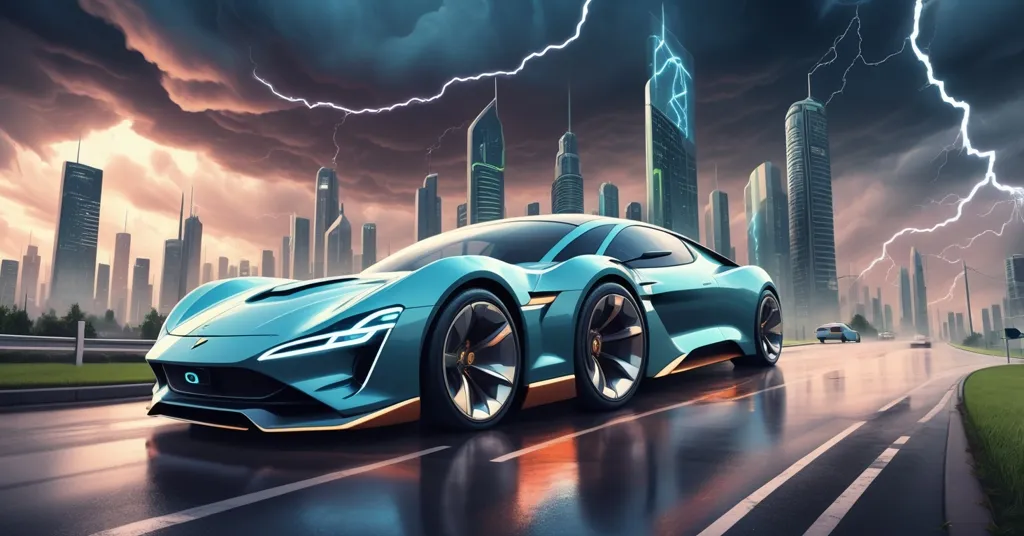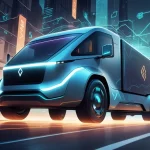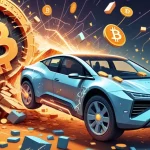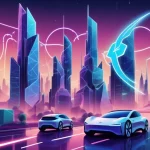Porsche Shocks Market: Ditches EV Plans Amid China Slump and Tech Fails

Porsche’s EV U-Turn: China Slump and Tech Woes Force a Hard Pivot
Porsche, the storied luxury automaker, has slammed on the brakes of its electric vehicle (EV) ambitions, citing a catastrophic sales drop in China and a belief that battery-powered cars can’t match the visceral punch of traditional engines. With new CEO Michael Leiters set to take over in January, the company is swerving back to petrol and hybrid models—a move that’s got the automotive world both intrigued and uneasy.
- EV Dreams Ditched: Porsche abandons aggressive electric vehicle plans due to a 40% sales collapse in China since 2022.
- Back to Basics: Focus shifts to petrol and hybrids, with a €1.8 billion loss on scrapped EV projects.
- Financial Carnage: 2025 profit forecast cut to 0–2%, alongside 3,900 job cuts by 2029.
China’s Market Crash: A Luxury Sales Nightmare
Luxury cars are more than just a ride—they’re a statement of power, prestige, and pure emotion. Porsche has been the benchmark for decades, with beasts like the 911 and Cayenne defining what high-end performance means. Their foray into EVs with the Taycan back in 2019 was a loud declaration: we can do green without losing grit. The early hype was real; the Taycan scooped up awards and teased a future where Porsche could dominate the luxury EV space. But then China—the market that once fueled insane growth for the brand—turned into quicksand. Sales have nosedived 40% since 2022 as local players like NIO and Xpeng churn out cutting-edge, government-backed EVs at a fraction of Porsche’s sticker price. This isn’t a minor setback; it’s a full-blown disaster showing how fast a key market can flip, as detailed in reports of Porsche’s strategic reversal amid weak demand in China.
To understand the mess, consider China’s EV landscape. Massive state incentives—think tax breaks, charging networks, and subsidies—give homegrown brands a leg up. NIO’s battery-swapping tech and slick software updates are perks Porsche can’t compete with yet. Toss in a cooling Chinese economy and a more cautious middle class, and you’ve got a recipe for Porsche’s market share to evaporate. Regaining that foothold without a serious strategy overhaul looks damn near impossible right now.
Michael Leiters’ Playbook: Nostalgia Over Innovation?
Stepping into this storm is Michael Leiters, the incoming CEO with a track record at Ferrari, McLaren, and even Porsche in an earlier role. He’s not beating around the bush about his disdain for current EV tech.
“The technology isn’t ready… EVs don’t offer the emotional thrill of traditional engines and lose value much faster,”
he’s declared, making his stance crystal clear. He’s talking about the raw, heart-pounding snarl of a petrol 911 versus the sterile hum of an electric motor. Sure, there’s something to that—but isn’t the bigger rush knowing your ride isn’t choking the planet? Or are we just waxing poetic over exhaust fumes now? Leiters is banking on the past, betting that Porsche’s soul lies in combustion, even if it means torching years of EV progress.
His roadmap is blunt: scrap plans for an all-electric SUV, swallow a €1.8 billion impairment charge (that’s a fancy way of saying they’re writing off cash sunk into dead projects), and bring back petrol and hybrid versions of fan favorites like the Macan and Cayman. It’s a nod to the diehards who want their cars loud and proud. But here’s the kicker—Ferrari, where Leiters cut his teeth, pulls off exclusivity with limited EV exposure because it’s a niche beast. Porsche plays to a wider luxury crowd. Can this retro obsession fly when the world’s speeding toward electric?
Financial Wreckage and Human Toll: Cuts Run Deep
The balance sheet tells a brutal story. Porsche’s stock has cratered by nearly two-thirds since May 2023, a glaring red flag of investor doubt amid shrinking demand and market chaos. Their 2025 operating margin forecast—basically, profit as a slice of revenue—has been slashed from a solid 14% to a pathetic 0–2%, with hopes of hitting 10–15% in the midterm feeling like a fever dream. Analyst Stephen Reitman from Bernstein didn’t soften the blow:
“It will take some time before we even get to that [10–15% midterm margin target].”
On top of that, new U.S. tariffs on European imports, courtesy of Trump’s policies, are a gut punch. With no American factories, every Porsche shipped stateside gets hit with extra costs, bleeding already tight margins dry.
Then there’s the body count. Porsche is set to slash 3,900 jobs—about 9% of its people—by 2029 in a desperate bid to save cash. That’s not just a line item; it’s real lives thrown into chaos over a corporate misstep. Let’s not bullshit around—this is the ugly underside of a luxury brand struggling to keep its shine.
Tech Stumbles: Software Glitches Stall Progress
Market woes and money troubles aren’t the only anchors dragging Porsche down—their tech game is lagging hard. Persistent software issues have stalled EV launches, with problems spanning glitchy infotainment setups to shaky battery management systems. Board member Sajjad Khan laid it out plain:
“We have to work hard to execute perfectly… improvements in quality and reliability should arrive by 2026 or 2027.”
Read that as: our EVs are half-baked, and they’ll stay that way for years. Compare this to Tesla’s seamless over-the-air fixes or NIO’s polished interfaces, and Porsche looks like it’s crawling while rivals sprint. For a brand that charges a king’s ransom, this kind of sloppiness isn’t just embarrassing—it’s a trust killer.
Customer Pulse: A Fanbase Torn Apart
What’s the word from the Porsche faithful and would-be buyers? Online chatter and forums reveal a fractured crowd. The old guard is popping champagne over the return to petrol, with sentiments like, “Hell yes, keep my 911 growling, not buzzing.” But the younger, green-leaning fans are pissed, venting frustrations like, “I was ready to shell out for a Taycan—now they’re bailing on the future?” Others are sweating resale values, echoing Leiters’ point that EVs tank in worth faster than combustion rides. This split lays bare Porsche’s dilemma: stick to heritage and lose the next wave of buyers, or push electric and alienate the purists. They’re damned either way.
The Global EV Surge vs. Porsche’s Risky Bet
Step back, and Porsche’s retreat looks like a high-stakes roll of the dice. The auto industry worldwide is charging toward electrification, propelled by hardline emission rules—Europe’s eyeing a 2035 combustion engine ban—and a growing hunger for sustainable options. Tesla moved 1.2 million EVs in 2023, while China’s BYD is gunning to be the top dog globally. Even luxury peers like BMW and Mercedes are piling into electric lineups. Analyst Pal Skirta from Metzler Research sounded the alarm:
“They will focus again too much on combustion engine vehicles, and then we’ll lose the EV race in the long run.”
He’s not wrong—if Porsche drags its heels, it could be eating dust in a decade while rivals own the electric luxury lane.
Could hybrids be the sweet spot? Toyota’s Prius shows they can blend efficiency with appeal, but Porsche’s hybrids better deliver race-ready performance at these prices, or they’re just a glorified stall tactic. And let’s not ignore broader tech disruption—blockchain could transform automotive supply chains or EV battery tracking for sustainability creds. Porsche’s tech fumbles mean they’re missing these plays, not just on the road but in the bigger innovation arena.
Volkswagen’s Golden Child Under Pressure
Within the Volkswagen empire, Porsche is a heavyweight David to VW’s Goliath. Despite being just 3.6% of deliveries over the last three years, it’s delivered nearly 30% of the group’s operating profit—a massive burden for a boutique player. Post-Dieselgate, when VW’s 2015 emissions scandal shattered trust, the hard pivot to EVs was partly about redemption. Now, Leiters is unwinding that, gambling on combustion’s emotional pull over a cleaner legacy. It’s a bold call, but if the EV wave keeps building, it could be a spectacular faceplant.
Key Questions and Takeaways on Porsche’s Pivot
Here’s the breakdown of the most pressing points as Porsche wrestles with this make-or-break moment:
- Why is Porsche ditching its EV push?
A crushing 40% sales drop in China since 2022, cutthroat competition from local EV brands like NIO, and Michael Leiters’ take that electric tech lacks soul and readiness forced this hard stop. - Does a return to petrol and hybrids spell doom long-term?
It might prop up near-term profits for fans of classic power, but experts caution it could leave Porsche trailing EV giants like Tesla, risking irrelevance as electrification dominates. - What outside forces are battering Porsche’s bottom line?
U.S. tariffs on European imports, a crumbling Chinese market, software hiccups, and a €1.8 billion hit on abandoned EV projects are obliterating profitability, with 2025 forecasts at a grim 0–2%. - What’s Michael Leiters’ angle as CEO?
Shaped by Ferrari and McLaren, Leiters champions passion and performance over hasty EV shifts, nudging Porsche back to traditional engines at a critical juncture. - How are workers and finances taking the hit?
Slashing 3,900 jobs by 2029 and tanking profit outlooks signal brutal financial strain and a rough road ahead for Porsche’s workforce caught in this upheaval.
Porsche carved its legend on speed and soul—now it’s doubling down on nostalgia at a time when the world’s racing to electric. Whether Leiters’ gamble pays off hinges on how swiftly the EV shift accelerates and if he can navigate market storms, tech flops, and a polarized fanbase. One truth stands out: in the battle for luxury driving’s future, Porsche isn’t tapping out—it’s just veering off course. Will it roar back to the lead, or get outpaced by the electric revolution?



